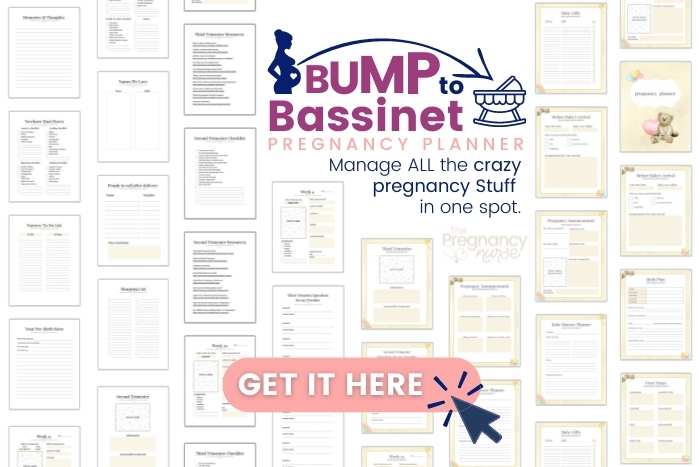📣 YOU are clearly getting prepared for pregnancy, birth & beyond — but do you wish your partner was more involved (looking for a teammate rather than just a cheerleader)? Couples love THIS! 💛🧡💚
Prenatal check-ups can seem really useless. You’re likely hot, tired and you REALLY don’t want to go wait at the office and then have what seems like an entirely useless office visit with your provider. Today we’re going to chat about six very normal things they will do at your appointments to make sure you and baby are healthy.
Hi, I’m Hilary — The Pregnancy Nurse 👩⚕️. I have been a nurse since 1997 and I have 20 years of OB nursing experience, I am also the curly head behind Pulling Curls and The Online Prenatal Class for Couples. 🩺 Follow me for more positive pregnancy & labor tips! 😊 I believe that prenatal appointments are one of the MOST important things you can do for your baby (even though they can seem useless sometimes — and yes, having 3 kids of my own I totally understand that feeling).
Before we get started, are you feeling overwhelmed by ALL there is on your plate during this pregnancy? I just created a brand new pregnancy planner full of 83 pages to help you get on top of what you need to do! It is TRULY created by me, so you know it’s going to have the best of tips for my pregnant friends.
Ok, back to prenatal APPOINTMENTS, and things your doctor does at them that seem useless, but can be super important:
Prenatal Appointment Timeline
While every doctor’s office is different, you should expect less appointments in the beginning, and more as you get closer to your due date.
Soon after you take your home pregnancy test, you’re going to want to set up your prenatal care with a provider. Most often they want to see you between 6-10 weeks gestation (meaning 2-8 weeks after you miss your first period).
Your first prenatal appointment is the most different one. Your first appointment will likely be your longest. It usually includes:
- A thorough family history, obstetrical (including anything that happened to a close family member) and medical history
- Pap smear
- Blood tests (SO IMPORTANT, don’t skip this!)
- Insurance information (important, but boring)
- Often they will schedule an ultrasound, or will do an ultrasound to check baby’s grown is and be more sure of your dates (or they will just ask for the date of your last menstrual period)
- Making sure you’re taking your prenatal vitamins to prevent birth defects
- Over the counter medications you can/can not take (until you discuss any medicine with your provider or a pharmacist you shouldn’t take it when pregnant)
- Often the first visit is just talking, they may not do a complete physical exam until your second appointment (especially if you came in very early).
Pro Tip: Talk with your close relatives about any obstetrical issues or health problems they had during their pregnancy before your first appointment (or sometime during your pregnancy) just so you are aware of your family’s (and your gene’s) history. It doesn’t MEAN something similar will happen to you, but it could be a higher possibility. This is important information.
Remember if you don’t love your first prenatal visit, you can always switch providers — just be sure to get all the testing information from your first provider.
Pro Tip: Always come with a list of questions you have for your provider to any of your appointments.
Important Things Your Provider Will Do At a Prenatal Appointment
As a note, these are not ALL the things that will be done at your appointment that are important — just the top five that happen at MOST appointments with your health care provider for MOST women.
Pro Tip: There are many different types of health providers you can see at a prenatal appointment. While only Nurse Midwives and MD’s deliver babies, you may also see a nurse practitioner or a physician’s assistant for your prenatal care. They will be trained in what to watch for and are perfectly fine to see for these visits (often they’re less behind as they don’t run out and do deliveries too).
Listen to the Heartbeat
Some doctors might use an ultrasound machine, but use will use a doppler (that checks for blood flow and makes a sound out of the movement) to check for baby’s heartbeat.
Most often that heartbeat can be heard around 10 weeks (plus or minus a few weeks). It is so fun to hear the first time. It is a simple, easy way to check out baby is doing. They will likely listen for a bit to make sure it’s fluctuating and check how many beats per minute it is going.
Sidenote: You can’t know the gender of your baby by the heart rate, sorry!
It is a sure fire way to know that baby is alive and doing well in your belly. If they CAN’T find the heart rate, it is possible that baby is hiding and they will likely order or do a quick ultrasound.
A heartbeat check is the way that most stillborn babies are found.
Measure Your Fundus/Feel your Belly
Your funds is the top of your uterus. Your doctor will likely measure from the top of your pelvis to the top of your uterus to see how big the baby is measuring.
Once your baby bump is pretty pronounced they will likely feel your baby to check baby’s positioning and engagement in your pelvis.
This just catches some issues that they might want to follow-up with on ultrasound. Measuring with a tape measure, and a discerning provider is one of the best ways to know if baby is possibly big or has other issues.
It may seem really “old school” but providers know that our hands are great tools that can tell us a lot really cheap.
I know a lot of the things in prenatal care seems very routine and not exciting, but they have been a tried & tested method to make sure that you are having a healthy pregnancy and they are catching things that aren’t normal. Regular prenatal visits are an important part of your pregnancy, and you need to make them a priority.
Your provider should be asking for your input as the visit progresses (and more as you get closer to labor). Grab my tips to making a choice right here:
Routine Labs/Ultrasounds
Your doctor will order routine labs and ultrasounds at your checkup. I have a few of those listed on my sister site’s pregnancy calendar post. These types of prenatal tests include;
- STI screens
- Urine tests
- Blood counts (CBC, blood type, rh factor etc)
- Genetic testing (for things like cystic fibrosis, or down syndrome)
- A drug screen if necessary
- An early ultrasound to check for dates
- A mid-pregnancy ultrasound to check for the growth of your baby (and often the sex of your baby if you wish)
- A mid pregnancy CBC (often to check for anemia)
- A glucose tolerance test to check for gestational diabetes
- A beta strep culture (strep group b) of the baby exit area at 36 weeks of pregnancy
Other doctors may see other labs necessary or it is their protocol to order other things.
Don’t be afraid to ask questions about what a test is for when they order it. For instance, I didn’t always do genetic testing because I didn’t think it was necessary.
I go over a LOT of these test in my free beginning prenatal class. It’s your first step in preparing for your birth. You can sign up here.

Blood Pressure Check
Having your blood pressure check, especially as you head into the 3rd trimester can be REALLY important. Your blood pressure can be an indication of preeclampsia or gestational hypertension. Both of those can be really serious and may require treatment.
Pro tip: They often also ask for a urine sample to see if there is protein in your urine. Protein in your urine can be an indicator of preeclampsia — one of the most important things they’re looking for during your pregnancy.
Keep in mind that OFTEN the first blood pressure check is high. If they find a high blood pressure initially, ask them to check again after you’ve settled into the exam room for a bit.
Weight Check
I know this can be troublesome for some pregnant people, but knowing your weight IS important.
One of the most important things is losing or quickly gaining weight in your third trimester can indicate issues with the baby’s growth or the amniotic fluid.
Weight gain could also be a pan of brownies you ate, but weight is only worth the weight YOU give it, and it if it bothers you a lot, weigh in backwards so that at least your providers can monitor it. Ask them to only discuss it if they find that extra labs/tests are necessary.
Pro Tip: If at any point your pregnancy turns into a “high-risk pregnancy” you should expect your appointments to increase with your provider.
Allow for Questions
Your provider should allow you a time to ask some questions. Personally, I liked having the questions I’d come up since the last visit written down (most often in your phone). That way you can be concise and not waste their time (or forget them) while also getting the education you need.
If they don’t stop on their own, be sure to stop them and get your questions answered. THAT is part of their visit too.
And then, they will schedule your next appointment, because prenatal care is VITALLY important and we want to make sure you always have an appointment scheduled with your provider. Keeping in mind a good time for next visit is smart.
So, like I said — your provider may do/order different things, but these 6 things will happen at most appointments for pregnant women. They are really important reasons to take the time to be seen.
While your healthcare provider should take the time to answer your questions, it really puts you ahead when you have taken a prenatal class. You’ll have more insightful questions about your own condition, and you’ll speak their language as they discuss your health with you. I think it’s really important, and I’ve decided one of the most open and educational (and fast) classes out there. Get you and your partner ready for this experience!
Have you checked a birth class off your to do list✅? I have a few I recommend:
❤️ Best class for couples {per BabyList}
👩💻 Best class available on demand
⚡ Best class JUST for pain management
👶 Best Postpartum-Only Prep
❤️🧡💛💚💙💜 My favorite class is here.
Now is the time to get started!
Want to do a vibe check before diving into the whole thing with me? — check out my free labor pro tips. It’s your first step toward getting in the driver’s seat of your birth.







 Stages of Labor Duration: How long does labor last?
Stages of Labor Duration: How long does labor last?
